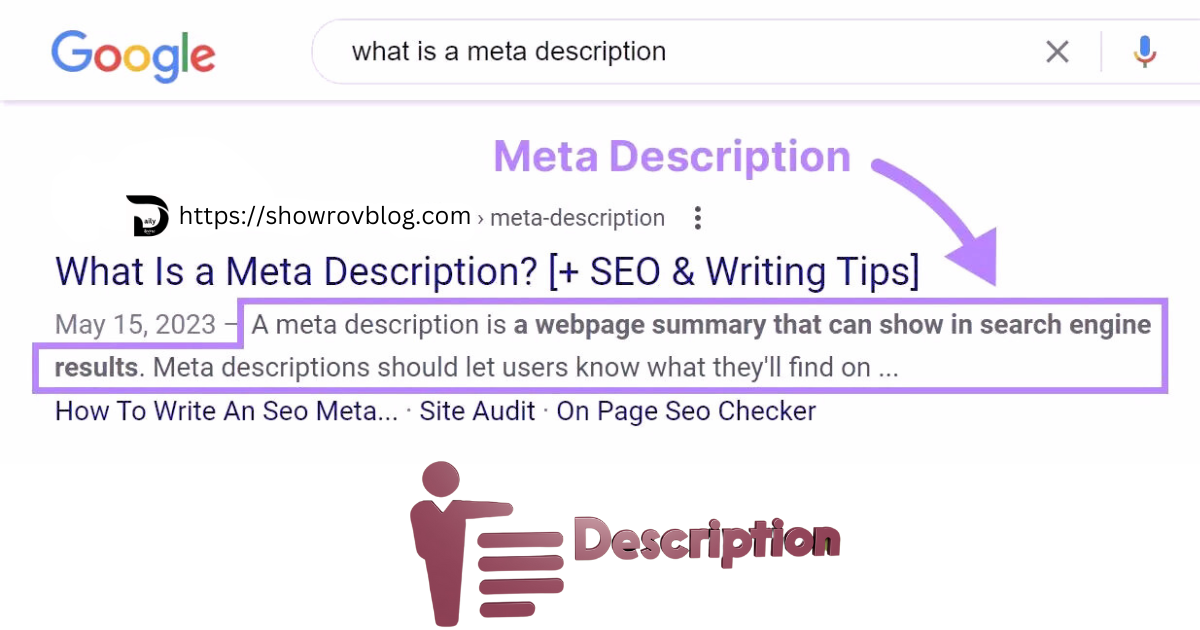SEO writing is a craft. Writing for both users and search engines is the responsibility of an SEO writer. You must be able to put fundamental SEO content principles into effect if you want to do that. Everything you need to know about SEO writing is included in this guide. To make sure that every piece of content you create is search engine-friendly, I’ll define SEO writing and provide you with 14 SEO content writing ideas.
1. What is SEO Content Writing?
Writing material with search engine optimization (SEO) in mind will help it rank highly in search engine results pages (SERPs).
It entails placing keywords strategically throughout the text, making sure the material is interesting and high-quality for users, and improving meta descriptions and title tags.
SEO content writing comprises not just optimizing content for search engines but also comprehending the target audience and producing content that appeals to their interests and demands.
This can involve doing research on the subjects that matter most to the audience, speaking to them in a way that speaks to them, and offering insightful or important information that they will probably find helpful. Achieving a balance between optimizing material for search engines and producing worthwhile and captivating information for readers is essential for effective SEO content production.
2. Why is SEO Content Writing Important?
Writing SEO content is essential because it raises a website’s search engine ranking and increases organic traffic. Increased brand recognition, more leads and conversions, and eventually higher sales for the company are all possible outcomes of this.
Furthermore, SEO content authoring can enhance a website’s user experience by making it more interesting and straightforward to navigate.
Through the creation of useful and high-quality content that is optimized for search engines, organizations may become recognized as thought leaders in their sector and gain the audience’s confidence. Additionally, SEO content production is a continuous process that calls for frequent upkeep and changes, which can assist companies in remaining competitive and relevant in the modern digital marketplace. Given the intense competition in the internet space, every company hoping to grow over the long haul needs to have a solid SEO strategy.
3. Organize Your Content
When talking about SEO, how you set up your blog is as crucial as what you write. Search engines look at important things like the page title, headers, URL, meta description, and content titles to figure out what your content is about and when to show it to people searching online.
It’s a good idea to naturally use your main keyword throughout your content. But, it’s especially crucial to have it in the Page Title, H1, URL, and meta description. This helps both readers and search engines understand exactly what each section is about. Just make sure to have only one H1 for each piece of content, and use H2s and H3s for any subheadings.
Adding images or videos to break up long paragraphs is an excellent way to make your blog easier to read and more engaging. If you’re putting rich media content in your blog, make the most of the title, caption, and alt-text by including the focus keyword. Search engines might not see your images, but they can read the descriptions.
4. Use Meta Descriptions
Make sure that all your SEO content on your website or blog has meta descriptions. While these may not be super crucial for ranking, they play a key role in boosting your click-through rate from search engine results.
There’s no certainty that Google will always showcase your meta description, but there’s a possibility it could pop up. It’s a good idea to make a little effort and include it on your page; it might just make a difference.
5. How Is Keyword Research Done for Writing SEO Content?
Keyword research involves finding the most relevant words for your business and the people you want to reach.
You can use tools like Google Keyword Planner and SEMrush to help with this.
It’s important to pick words that have a lot of searches but not too much competition.
Once you know the best words for your business and audience, make sure to use them on your website, blogs, social media, and other online marketing.
This will help your site rank better in search results and bring in more visitors. But don’t force keywords into your content; they should fit naturally. Also, think about using longer, more specific phrases called long-tail keywords. They can be easier to rank for and often lead to more sales.
6. Does Duplicate Content Affect Your SEO?
Yes, having the same content in more than one place can harm your SEO efforts.
Search engines like it when your content is unique and not copied, so if you have the same content on your site or on different sites, it can affect how highly your website appears in search results.
Additionally, having the same content in multiple places can confuse search engines. They might not know which version of the content to show in search results, which means fewer people might see your website. To keep things in check, regularly check your content, find any copies, and either get rid of them or combine them. If you keep making new and unique content, you have a better chance of showing up higher in search results and getting more people to visit your site.
7. Optimize your Featured Snippets
Featured snippets help your content show up at the very top of search results. They’re those brief information bits you see at the top of certain search result pages. To boost your chances of getting featured snippets, structure your content to answer common questions about your topic. Keep paragraphs short and sweet, use bullet points for easy reading, and sprinkle relevant keywords throughout your content.
8. You have to Update Old Content
Search engines really like new content. Remember, how recent your content is comes in fourth on the list of things that affect how your content is ranked. If you go back and make your old blog posts better, more useful, and more reliable, it can really boost how high they show up in search results.
Here’s what you can do:
1. Find the blog posts that could do better for popular keywords.
2. Improve or rewrite those posts to make them more accurate and detailed.
3. Follow the best practices for on-page SEO and add prompts within and at the end of your post to encourage action.
4. Put out the improved article and make sure to change the publish date so search engines take notice and update your content in their results.
9. you need to Write Great Content
Ultimately, the key for a content writer is producing excellent content. That involves making it informative, helpful, and enjoyable for your audience.
Ensure your content is reader-friendly, with short sentences and paragraphs. Craft a compelling headline to grab attention, and sprinkle relevant keywords throughout. Also, remember to add a meta description that accurately represents your content and entices readers to click through.
10. Promote, your content on Social media
Social media is a good way to share your content and show it to more people. Put your blog posts on social media and ask your followers to share them. But don’t overdo it with too much self-promotion. Instead, make content that’s valuable and easy to share.
11. Add And Optimize Images
Before you publish, make sure your content has good pictures. Adding images makes your content more interesting and easier to read. Even though it’s not directly about SEO writing, it helps in a few ways:
- People are more likely to share content with good pictures on social media than content without any.
- You can use the alt text on images to give search engines more hints about your content.
- When you optimize your images well, you have a better chance of showing up in Google image searches for your target (or similar) keywords.
12. Make sure Your Content Easy To Read On Mobile-Tablet
When you write content, make sure it’s easy to read on phones and tablets. Here’s how:
- Use a big enough font.
- Break up the text into short paragraphs.
- Use lists when it makes sense to help people understand.
- Use pictures that change size depending on the screen.
- Make sure people can tell the difference between the main content and ads.
- Make sure the page loads quickly and doesn’t have annoying popups.
13. Optimize your Content For E-E-A-T
On the internet, Google algorithms figure out if a page shows experience, expertise, authority, and trustworthiness on a topic. In the SEO world, it’s called E-E-A-T and is a big deal for content quality.
Here you can check the relevant quote from Google’s guidelines on content quality.
You can try to improve your SEO copy for E-E-A-T. Follow these simple guidelines:
- Every page needs the author’s name and bio shown (check how I do this in all my posts).
- Each page should link to reliable sources.
- Your page and site, in general, should get links from other trustworthy and related sites.
14. How Do You Monitor SEO Content Writing Outcomes?
Tracking results for SEO content involves looking at important things like organic traffic, keyword rankings, and conversion rates. Tools like Google Analytics and Ahrefs can help you keep an eye on these metrics. Google Analytics is a free tool that shows you details about your website traffic and what users do on your site. You can see how many people visit, which pages they check, how long they stick around, and where they’re coming from.
This information helps you make your content better for users and boosts your website’s overall performance. Ahrefs, a paid tool, focuses on SEO analysis. It gives you in-depth data on your site’s backlinks, keyword rankings, and even what your competitors are up to. Using Ahrefs helps you watch how well your SEO is doing and find areas to make things even better. Both tools are crucial for keeping tabs on your SEO content and making sure more people can find your website on search engines.
Conclusion
SEO content writing might feel overwhelming initially, but it’s essential for success online. We’ve answered ten common questions about SEO content for beginners, offering practical tips to help you create content that both readers and search engines will appreciate.
[FAQ]
Meta tags and headings provide valuable information to search engines about the content of a webpage. Optimizing them with relevant keywords can improve a page’s chances of ranking higher in search results.
Why is it important to focus on readability and user engagement in SEO content?
Readability and user engagement are critical factors that influence how long visitors stay on a webpage and how likely they are to return. Search engines prioritize user experience, so content that is easy to read and engages the audience tends to perform better in rankings.
What are some key guidelines for SEO content writing?
It’s essential to focus on keyword research, write high-quality and relevant content, optimize meta tags and headings, ensure readability and user engagement, incorporate multimedia elements, and regularly update and maintain content.















